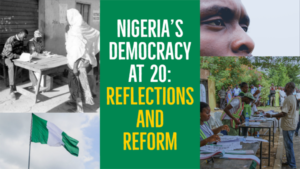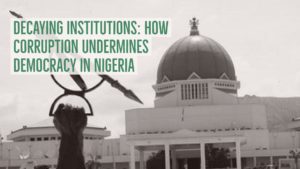The #EndSARS protests that have erupted across Nigeria may become the most important democratic breakthrough since the end of military rule in 1999 and the peaceful transfer of power after the elections of 2015, writes Dave Peterson, Africa Program Director at the National Endowment for Democracy (NED).
 Violent efforts to suppress it are alarming. This is by far the biggest mass movement in Nigeria in recent years, similar to the protests we have been experiencing in the US. Numerous smaller iterations of the #EndSars campaign have been attempted in recent years, but this one seems to be driven by citizens rather than civil society groups, sparked by a video circulated on social media, and fueled by decades of unrelenting police and security force brutality. Karen Attiah in The Washington Post has eloquently captured the moment.
Violent efforts to suppress it are alarming. This is by far the biggest mass movement in Nigeria in recent years, similar to the protests we have been experiencing in the US. Numerous smaller iterations of the #EndSars campaign have been attempted in recent years, but this one seems to be driven by citizens rather than civil society groups, sparked by a video circulated on social media, and fueled by decades of unrelenting police and security force brutality. Karen Attiah in The Washington Post has eloquently captured the moment.
Civil society has been engaged in the broader campaign, but the recent wave has been organic and decentralized, with non-traditional civil society taking a lead. Black Lives Matter protests in the US renewed or reinvigorated interest in #EndSARS.
Nigerian government responses have been all over the place, from denials, to statements calling for calm, to calls for investigations. There is plenty of political posturing, as different portions of the federal and state governments issue different statements, blame each other, and pursue different responses. Nigeria is a democracy, albeit a seriously flawed one. Yet the massacre in Lagos on October 20 underscores the corruption and fecklessness that have stifled the country’s development and democratic potential.
It is not just abusive police; as some of the protesters have noted, it is exorbitant salaries for members of the national assembly when teachers and health workers earn paltry wages; it is a political system still too reliant on godfathers and sacks of cash rather than the needs of citizens and their expressed will.
 Although civil society did not initiate the protests, it recognizes the value in this being organic and citizen driven, even if there are threats in terms of it getting more violent, or making less than coherent demands. The protests are morphing into calls for broader government reform, but it is yet to be seen what exactly will be prioritized beyond police reform. Civil society is still assessing how to harness the demand for reform, without stifling the public mobilization. NED’s partners have condemned the violence and support the right to peaceful protest.
Although civil society did not initiate the protests, it recognizes the value in this being organic and citizen driven, even if there are threats in terms of it getting more violent, or making less than coherent demands. The protests are morphing into calls for broader government reform, but it is yet to be seen what exactly will be prioritized beyond police reform. Civil society is still assessing how to harness the demand for reform, without stifling the public mobilization. NED’s partners have condemned the violence and support the right to peaceful protest.
There is also a class dimension to the protests. Middle class actors can organize or initiate protests, but the issue must resonate with the broader public in order to gain steam. There is broad public support for police reform, and widespread condemnation of the government’s heavy-handed response to the protests, even if there is a degree of confusion and denial over responsibility for fatalities and who ordered security force interventions. While it appears that security forces shot protestors, it is possible that in some cases non-state actors perpetrated acts of violence, directly or indirectly on behalf of the state.
 We are now seeing alignment, but this will be challenging to sustain – civil society will need to help. Interestingly, the international community is paying a lot of attention. The Nigerian government fiercely guards its sovereignty, but it is fairly responsive to united domestic criticism, and very sensitive to international criticism. There has been plenty of that.
We are now seeing alignment, but this will be challenging to sustain – civil society will need to help. Interestingly, the international community is paying a lot of attention. The Nigerian government fiercely guards its sovereignty, but it is fairly responsive to united domestic criticism, and very sensitive to international criticism. There has been plenty of that.
Nigerian democracy has long suffered from a lack of political will. Now may be the long awaited opportunity for that to change.
“Nigerians taking to the streets in large numbers to protest police brutality deserve the protection of security services, not to be targeted by them,” said Jon Temin, director of Africa programs at Freedom House (below).
Nigeria: Freedom House Condemns Attacks on Peaceful Protesters https://t.co/KycSf9Y8dE
— Democracy Digest (@demdigest) October 22, 2020







